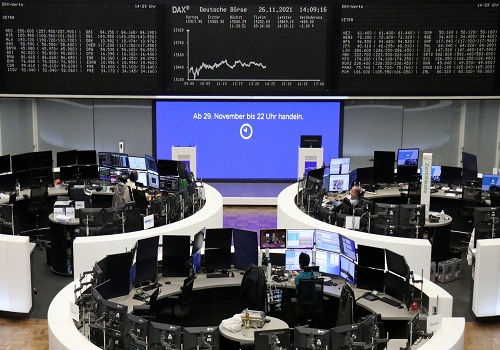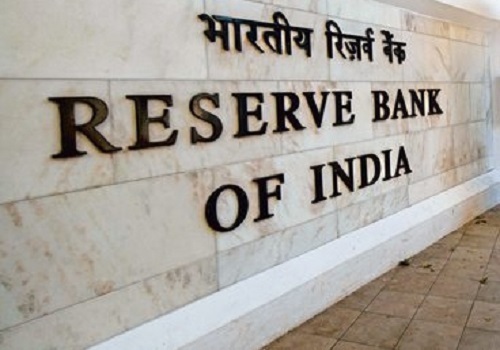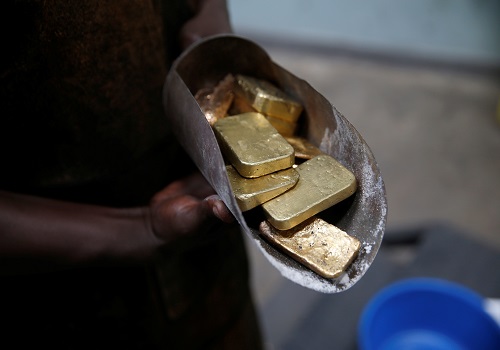Investors cling to hope as Omicron spreads, shares rebound

Follow us Now on Telegram ! Get daily 10 - 12 important updates on Business, Finance and Investment. Join our Telegram Channel
LONDON - A semblance of calm returned to world markets on Monday as investors waited for more details to assess the severity of the Omicron coronavirus variant on the world economy, allowing battered stocks and oil prices to rebound.
European shares rallied over 1%, U.S. stock futures pointed to a firm Wall Street open, oil prices bounced more than $3 and safe-haven bonds lost ground as markets latched onto hopes the new variant of concern would prove milder than initially feared.
News of the variant triggered alarm and a sell-off on Friday that wiped roughly $2 trillion off the value of global stocks, as countries slapped on new curbs for fear it could resist vaccinations and upend a nascent economic re-opening after a two-year global pandemic.
Omicron has now been found as far afield as Canada and Australia. The World Health Organisation said Monday the heavily mutated variant poses a very high risk of infection surges.
Still, investors drew comfort from signs that its impact may not be as grave as feared. In Southern Africa, where the new strain was detected last week, a top infectious disease expert said existing COVID-19 vaccines are probably effective at preventing severe disease and hospitalisation.
Though experts said it was too early to say for certain how severe the illness caused by the variant will be, a South African doctor who was one of the first to suspect a new strain said on Sunday patients so far appeared to have mild symptoms.
"We're all still reaching around in the dark and will need more data, but things do seem a bit more hopeful than they were on Friday," said BlueBay Asset Management CIO Mark Dowding.
Graphic: Morning bid - https://fingfx.thomsonreuters.com/gfx/mkt/gkvlgdnrlpb/Morning%20Bid.PNG
S&P 500 futures added 0.85% and Nasdaq futures, 1%. Both indexes suffered their sharpest fall in months on Friday with travel and airline stocks hit hard.
Europe's STOXX 600 index rallied 1%, having on Friday suffered its biggest one-day fall since June 2020. MSCI's broadest index of Asia-Pacific shares outside Japan eased 0.4%, but found support ahead of its 2021 low. Japan's blue-chip Nikkei fell 1.6% as the country moved to bar foreigners to head off the Omicron strain.
And having plunged more than 10% on Friday in their biggest one-day drop since April 2020, oil prices rallied more than 4%. Brent crude oil futures stood at around $76 a barrel, U.S. crude rose 4.9% to $71.46.
Speculation that oil producing group OPEC and its allies, known as OPEC+, may pause an output increase in response to the spread of Omicron aided the oil price rebound.
Graphic: Brent bounce - https://fingfx.thomsonreuters.com/gfx/mkt/lbvgnbkqapq/brent.PNG
SHIFTING EXPECTATIONS
European Central Bank policymakers sought to reassure investors rattled by the new coronavirus variant, arguing that the euro zone's economy had learned to cope with successive waves of the pandemic.
This encouraged a move out of safe-haven bond markets, which had rallied on Friday as investors priced in the risk of a slower start to rate hikes from the U.S. Federal Reserve, and less tightening by some other central banks.
Two-year Treasury yields edged up to 0.54%, after falling 14 basis points on Friday in the biggest drop since March last year. Fed fund futures had pushed the first rate rise out by a month or so.
European sovereign bond yields rose , with latest inflation numbers highlighting the challenges ahead for the ECB.
German inflation is set to surpass the 5% threshold in November for the first time in nearly three decades, regional data from several states suggested on Monday.
The shift in rate expectations has undermined the dollar, to the benefit of the safe-haven Japanese yen and Swiss franc.
On Monday, the dollar steadied at around 113.45 yen, after sliding 1.7% on Friday. The dollar index held at 96.18, after Friday's 0.7% drop.
The euro was struggling again at $1.1291, following its rally from $1.1203 late last week.
Agnès Belaisch, chief strategist Europe at Barings Investment Institute, said that as Fed hikes get priced out and the dollar weakens, currencies such as the euro and yen should benefit.
"Safe assets will keep a bid and duration will be a good place to position again," she said. "Careful investors would want to take some profit in equities after a good run -- the reopening trade will come back later, hopefully with a revenge."
Turkey's lira meanwhile slid over 4%, nearing recent record lows versus the dollar, after President Tayyip Erdogan said he will never defend interest rate hikes nor compromise on the issue.





















